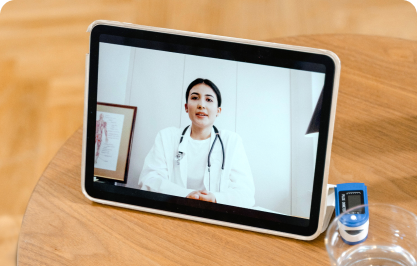A Human Solution to the Rising Cost of Healthcare
A health and wellness membership for everyday care, paired with medical cost sharing for peace of mind when big medical needs arise.

Join for as low as $142/month.
We have not increased membership prices in over 6 years.
I'd highly recommend Knew Health to anyone that, like us, are self-employed, not interested in paying even higher fees for catastrophic insurance plans that don't have many benefits and are dedicated to wellness."
Rosa, Member Since 2024

Knew Health is such a great alternative to healthcare. I’m so grateful for their excellent customer service and willingness to help!"
Amy, Member Since 2022
"I LOVE Knewhealth! My family and I have been with them for over six years and have saved so much over traditional insurance. Love their customer service and how I get to choose the care I want. Best decision ever!"
Jennie, Member Since 2019
“Wonderful customer service team. Prompt communication and easy to work with. I’ve compared many health sharing organizations and Knew Health seems to have the best overall value. Highly recommend.”
Calli, Member Since 2021
I'd highly recommend Knew Health to anyone that, like us, are self-employed, not interested in paying even higher fees for catastrophic insurance plans that don't have many benefits and are dedicated to wellness."
Rosa, Member Since 2024
Knew Health is such a great alternative to healthcare. I’m so grateful for their excellent customer service and willingness to help!"
Amy, Member Since 2022
What Do I Get?

Peace of Mind for Illnesses, Injuries and Pregnancy
Knew Health is a community-driven solution that helps you manage unexpected major medical expenses. When life throws you a curveball—like a sudden illness, injury, or surgery—you’ll have peace of mind that a community of like-minded people has your back, so you’re never facing medical bills alone.

VIP Concierge Care Team
No long hold times, no frustrating call centers—just real, friendly experts, all based in the U.S., ready to help when you need it. Our concierge support team is part of your community, providing fast, easy and personalized service that puts you and your family first.

Affordable Monthly Payments
Medical cost sharing offers an affordable alternative for healthcare, helping Members save an average of 40-50% on their healthcare costs. By joining a like-minded community, Members share medical expenses without the burden of high monthly costs or hidden fees.

Tailored Health Support
Free Health Coaching, 24/7 Telemedicine, free blood work, fitness classes and supplements.

No Network Limitations
Choose your own healthcare providers without the restriction of networks. Even licensed holistic and integrative providers.

General Wellness Allowances
We share in several general wellness services, like annual physical to help keep you healthy, which you can begin using from the very beginning of your membership.
Healthcare with Advantages
We pair wellness-focused resources to keep you feeling your best with all the tools you’ll need to save money when large, unexpected medical costs happen.
Extensive Sharing
Knew Health is open to anyone who is health-conscious and is looking for wellness resources alongside peace of mind for unexpected medical costs.
Inclusive
We accept everyone, regardless of past medical conditions or religious affiliations.
Proven
Knew Health is a community of thousands of individuals, families and businesses who benefit from our skilled team of medical bill negotiators, which average a 46% reduction in medical costs. Our Members save on routine care and on the cost of new medical conditions.
Want To Get Started?
Get FREE pricing today! Monthly price is based on your individual needs and personal information such as age, location, etc.

Meet the CEO
Knew Health is proud to have Joshua Rosenthal as CEO, bringing over 30 years of experience in the Health and Wellness field. As the father of Health Coaching and founder of the world’s largest nutrition school, Joshua set out to change the future of healthcare and help people live better lives. He is passionate about his philanthropy work and making a difference in the healthcare space.

Meet the Director of Member Services
Knew Health is proud to have Hillary Zalabak as Director of Member Services. With over 15 years of experience in customer relations, Hillary is deeply committed to the care of all Members. She recognizes the difference between being a big company and a great company, which is ensuring our Members and their well-being are our first priority. It is with the respect and compassion that Hillary and her team bring to Knew Health each day that we make a difference in our Members’ lives.

Frequently Asked Questions
What is Knew Health?
Knew Health is a community of health-conscious individuals committed to protecting our well-being and supporting one another in times of unexpected medical costs due to new illnesses or injuries.
Are you faith-based?
Knew Health is an inclusive Community open to anyone who is health-conscious and is looking for preventive health and wellness resources alongside peace of mind for unexpected medical costs.
Why haven’t membership rates increased since 2019?
This has resulted from empowered Members that know how to obtain the best quality care for the lowest cost and an expert Care Team that goes above and beyond to lower even the toughest bills.
Can I really see any licensed provider I want?
Yes. We have no network restrictions. Simply present yourself as a self-pay patient, and our Care Team can help negotiate fair pricing on your behalf. Please note that UCR (Usual, Customary, and Reasonable) rates still apply. Members are responsible for ensuring fair and reasonable rates. If you choose a provider that charges significantly more, monthly contributions may increase for the whole community.
What is an Initial Unshareable Amount (IUA)?
The Initial Unshareable Amount, or IUA, is the amount of money you pay first when you have a medical need, like an illness or injury. After you pay this amount, the Knew Health Community helps share the rest of the eligible medical costs.
Once you’ve paid the IUA for a specific health issue, you don’t have to pay it again for that issue unless you’ve been symptom-free for 12 months. Also, you’ll never have to pay more than three IUAs in one membership year, no matter how many medical needs you have.
This means if you have a fourth medical issue or more, you would not be responsible for an IUA for those issues.
What about maternity or pre-existing conditions?
Maternity needs can be shared if the pregnancy starts after 90 days of membership, and the due date is one year or more from when your membership begins. Pre-existing conditions have specific guidelines—call us at
866-977-8298 for more details.
How quickly are expenses shared?
If your bills are eligible and the documentation is complete, many share-outs happen within 7-14 business days. Our goal is to simplify the process and get you the support you need quickly.
Can businesses or families join?
Yes! We support individuals, families, and small businesses. Each membership is tailored to your household size and
IUA level.
Is membership locked in for a year?
No. Knew Health memberships are month-to-month. You can cancel at any time, or make updates, like adding or removing members, on a monthly basis.
See My Price
Transparent pricing from day one—your simple, affordable, and friendly alternative to traditional insurance.